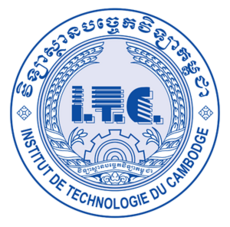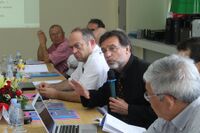Organization:Institute of Technology of Cambodia
វិទ្យាស្ថានបច្ចេកវិទ្យាកម្ពុជា | |
 | |
Other name | ITC, Sala Techno |
|---|---|
| Type | Public research |
| Established | 1964 |
| President | Dr. Phoeurng Sackona |
| Director General | Dr. Om Romny |
Academic staff | 263 |
Administrative staff | 124 |
| Students | 4,323 (2018)[1] |
| Address | P.O. Box 86, Russian Federation Boulevard , , Cambodia [ ⚑ ] : 11°34′14″N 104°53′53″E / 11.5706°N 104.8981°E |
| Campus | Phnom Penh Tboung Khmum Province |
| |u}}rs | |
| Affiliations | Agence Universitaire de la Francophonie Greater Mekong Sub-region Academic and Research Network |
| Website | itc |
The Institut de Technologie du Cambodge (ITC) (Institute of Technology of Cambodia, Khmer: វិទ្យាស្ថានបច្ចេកវិទ្យាកម្ពុជា), also known as Sala Techno (Khmer: សាលាតិចណូ), is a higher education institution in Phnom Penh, Cambodia that trains students in science, technology and engineering. Enrollment is approximately 3,500 undergraduate students and 200 graduate students.
History
The Institute was founded in 1964 as Institut de Technologie Supérieure d'Amitié Khmère–Soviétique (ITSAKS; The Superior Technology Institute of Khmer–Soviet Friendship, Khmer: វិទ្យាស្ថានបច្ចេកទេសជាន់ខ្ពស់មិត្តភាពខ្មែរ សូវៀត). It was funded by the Soviet Union from 1964 to 1975 and from 1980 to 1991. This support ended in 1991 with the dissolution of the Soviet Union.[not verified in body]
In 1993, the Royal Government of Cambodia and the Government of France signed an agreement to develop the renovation of the institute which then took its present name, Institut de Technologie du Cambodge. From 1993 to 2004 the ITC was operated under the framework of French grant assistance (the French Ministry of Foreign Affairs and the French embassy) and run by Cambodia's French-language Agency of Higher Education (AUF).[not verified in body]
In 2017, its second campus was opened in Tboung Khmum Province.
Education
The Institute of Technology of Cambodia (ITC) is one of Cambodia's highest education institutions.[2] It offers a full range of education and research programs in engineering to all of its students. Programs are offered in French and English.
ITC has been steadily building its international standing by expanding the international features of its academic program, promoting faculty and student exchanges, and developing a reputation for research. ITC faculty members are distinguished in both teaching and research activities. The institute has an established centre for research and innovation to further promote unique research areas and cutting-edge research.
In the freshman undergraduate program, students complete a foundation year before choosing their majors in the engineering program.[citation needed]
As of June 2017, ITC had 263 lecturers and 3,729 undergraduate students.[3] From the 2017–18 academic year, the number of students is 4,942.
Programmes
- Matriculation programme: 2 years
- I.Com: 2 years *Bachelors programmes: 2 years
- Acting programmes: 3 years
Dual-degree programs can be applied for with some universities in Europe such as INSA Rennes and INP Toulouse.[citation needed]
Organisation
ITC has nine faculties or departments plus its Foundation Year Department, Research Centre, Graduate School, and Centre for Multimedia and Cyber University (distance education).
| Department | Abbr. | French |
|---|---|---|
| Architectural Engineering ទេពកោសល្យស្ថាបត្យកម្ម |
OAC | Option d'Architecture |
| Civil Engineering ទេពកោសល្យស៊ីវិល |
GCI | Génie Civil |
| Chemical Engineering and Food Technology ទេពកោសល្យគីមីនិងអាហារ |
GCA | Génie Chimique et Alimentaire |
| Electrical and Energy Engineering ទេពកោសល្យអគ្គិសនីនិងថាមពល |
GEE | Génie Électrique et Énergétique |
| Geo-resources and Geotechnical Engineering ទេពកោសល្យធនធានរ៉ែនិងភូគព្ភសាស្ត្រ |
GGG | Génie Géo-ressources et Géotechnique |
| Industrial and Mechanical Engineering ទេពកោសល្យឧស្សាហកម្មនិងមេកានិក |
GIM | Génie Industriel et Mécanique |
| Information and Communication Engineering ទេពកោសល្យព័ត៌មានវិទ្យានិងទំនាក់ទំនង |
GIC | Génie Informatique et Communication |
| Rural Engineering ទេពកោសល្យជនបទ |
GRU | Génie Rural |
| Telecommunication and Network Engineering ទេពកោសល្យទូរគមនាគមន៍ និង បណ្តាញ |
GTR | Génie Télécommunication et Réseau |
Graduate School
- Master of Civil Engineering
- Master of Electrical and Energy Engineering
- Master of Water Resources Engineering
- Master of Agro-Industry and Environment Engineering
- Master of Industrial and Mechanical Engineering
- Master of Mobile Technology
- Master of Urban Water and Sanitation Engineering
- Master of Materials Science and Structures
- Master of Mechatronics and Information Technology[3][1]
Admissions
Each year, 1,000 high school students from across Cambodia are recruited by the entrance exam committee. The entrance exam is held in mid-October. Applicants must have passed high school exams and scored well in basic science to be admitted to ITC.
ITC accepts students for engineer's, bachelor's and master's degrees in fields of engineering with an emphasis on matriculating students through to graduate programs. Students should possess a grade point average (GPA) of not less than 2.5 together with a proficient score of French or English.
Fees vary from program to program, ranging between 40,763,000 and 81,526,000 ៛ per year. Scholarships are offered to students for financial need and for merit.
Administration
The Board of Trustees (Khmer: ក្រុមប្រឹក្សាភិបាល, French: Conseil d'administration) of ITC was established in 1994 under French administration. The role of this board is to follow the progress of activities by the directors and to endorse the academic curriculum, new programs, and the budget and action plan proposed by the directors. This board has an annual meeting in mid-June. It is composed of members from stakeholders such as the Ministry of Education, Ministry of Finance, Ministry of Industry, French Embassy, Japanese Embassy, the consulate of Belgium, Japan International Cooperation Agency (JICA), a representative from the Board of Consortium, the Director of ITC, ITC alumni, and private-sector representatives.
Minister for Culture and Fine Arts Dr. Phoeurng Sackona serves as the president of the Board of Trustees.
The Academic Committee evaluates and endorses the curriculum to maintain the quality of education and to meet standards with international partners from universities in Europe and Asia, national organizations, and the private sector. This committee has a 5-year term and will be renewed until 2018. There are two groups of board members. Full members have voting rights while invited members can give suggestions and recommendations. This committee has 12 members from higher education institutions from France, 2 from Japan, 1 from Thailand, 2 from Belgium, 2 from private sectors and 1 from the Cambodian government.[citation needed]
Research programs
During the last 5 years,[when?] 35 research projects were active each year. Around 50 researchers are permanently conducting research in different fields. Currently,[when?] ITC is pursuing a policy of strengthening its competitive research areas and supporting cutting-edge research, including prioritized research programs linked to urban management, waste water, hydrology, irrigation, food safety, air quality, new energy, urbanization, robots, and information and communications technology.[citation needed]
Corporate relationships
More than 80 higher education institutions from around the world have signed agreements with ITC. Most of the agreements are with colleges and universities in France , Belgium, Finland , Spain , Norway , Italy, Germany , Russia , Japan , Korea, China , and Association of Southeast Asian Nations (ASEAN) countries.
National and international companies, the private sector, and government agencies have partnerships with the ITC.
École Polytechnique of Paris is among the stronger partners with ITC, and each year several ITC students have been recruited to study with them. In fiscal year 2015–16, ITC sent 86 students and staff to continue their graduate programs with university partners in other countries.[citation needed]
References
- ↑ 1.0 1.1 "General Document and Pedagogical Record". Institut de Technologie du Cambodge. http://data.itc.edu.kh:8090/itcdot/CA/CA2018/CA%202018%20-%20General%20Document%20and%20pedagogical%20record.pdf. Retrieved 23 June 2018.
- ↑ name=http://eurocham-cambodia.org/member/11/Institute-of-Technology-of-Cambodia-ITC
- ↑ 3.0 3.1 "Director's Report 2016–2017". Institute of Technology of Cambodia. 28 June 2017. http://data.itc.edu.kh:8090/itcdot/CA/CA2017/CA%202017%20Director%20Report.pdf. Retrieved 3 December 2017.
External links
- Institute of Technology of Cambodia
- Information at Kingdom of Cambodia's Ministry of Education, Youth, and Sport







